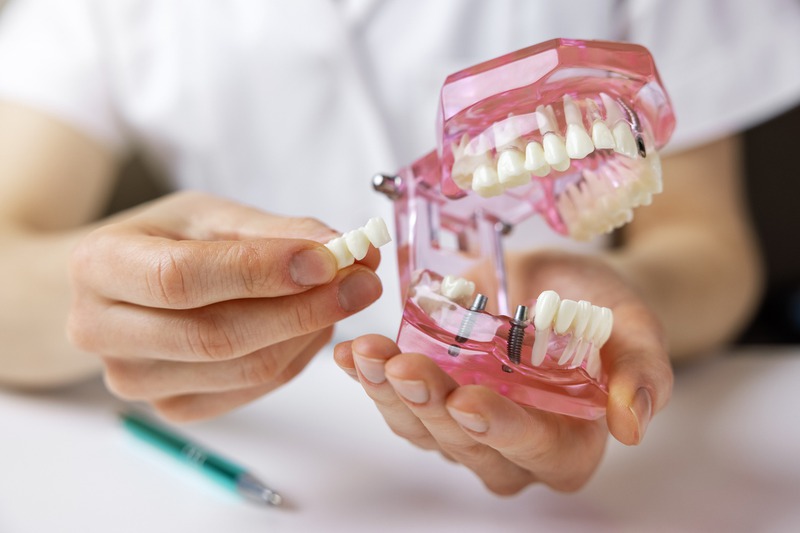
How to Maintain and Take Care of Your Dental Bridges?
Uncompromising oral hygiene can go a long way in maintaining the brightness of your smile and the durability of dental structures such as dental bridges. A dental bridge is an artificial component attached between two porcelain crowns to fill a gap left by a missing tooth. However, it is important to note that dental bridges require a great deal of attention and meticulous cleaning for them to offer the desired durability, performance, and aesthetic appeal.
Maintaining and caring for your dental bridges is essential for ensuring their longevity and oral health benefits. Here are some essential tips to help you properly care for your dental bridges:
1. Practice Good Oral Hygiene
Establishing and maintaining a robust oral hygiene routine is crucial for the health of your dental bridge and surrounding teeth and the upkeep of high-quality dental implants. Brushing your teeth, bridge, and dental implants twice daily with a soft-bristled toothbrush and fluoride toothpaste helps remove plaque, bacteria, and food particles that can accumulate on the surfaces. Pay extra attention to the areas where the bridge or dental implants meet the gums, as plaque buildup can contribute to gum disease and compromise the stability of both the bridge and the dental implants.
2. Use Proper Flossing Techniques
Flossing is an essential part of oral hygiene that helps clean the spaces between your teeth and under the bridge, where plaque and food debris can accumulate. Proper flossing techniques are crucial to avoid damaging the bridge or irritating the surrounding gums. Use dental floss or a floss threader to clean gently between the abutment teeth and under the bridge’s false tooth (pontic). Consider using waxed floss or dental tape, which may be easier to maneuver around the bridge.
3. Avoid Sticky or Hard Foods
Certain foods can risk the integrity of your dental bridge, increasing the likelihood of damage or dislodgment. Avoid chewing on hard or sticky foods such as hard candies, ice, popcorn kernels, nuts, and sticky candies, as these can exert excessive force on the bridge or cause it to become dislodged. Opt for softer, easier-to-chew foods and cut large or challenging items into smaller, more manageable pieces to reduce the risk of damage. Consult your dentist for personalized dietary recommendations if you have specific food concerns.
4. Attend Regular Dental Check-ups
Regular dental check-ups and cleanings are essential for monitoring the health of your dental bridge and detecting any issues early on. Your dentist will comprehensively examine your bridge during these appointments, checking for signs of damage, decay, or loosening. Professional cleanings performed by a dental hygienist help remove plaque and tartar buildup around the bridge and along the gum line, reducing the risk of gum disease and maintaining optimal oral health. Your dentist may also take X-rays periodically to assess the underlying bone’s condition and ensure the bridge’s stability.
5. Avoid Using Teeth as Tools
Using your teeth as tools to open packages, tear open packages, or bite down on hard objects can cause damage to your durable implant crowns and bridges and compromise their integrity. Avoid using your teeth for anything other than chewing food, and use appropriate tools instead to prevent unnecessary stress on the crowns and bridges. Using scissors, bottle openers, or other tools can help protect your implant crowns and bridges from damage and prolong their lifespan.
6. Quit Smoking
Smoking and tobacco use have detrimental effects on oral health and can increase the risk of complications that may affect the longevity of your dental bridge. Tobacco use is a significant risk factor for gum disease, tooth decay, and oral infections, all of which can compromise the health and stability of your bridge. Additionally, smoking can stain and discolor your teeth and bridges, affecting their appearance and aesthetic appeal. Quitting smoking can improve your oral health and overall well-being, reducing the risk of complications and ensuring the long-term success of your dental bridge.
7. Wear a Mouthguard
If you participate in contact sports or activities that pose a risk of dental injury, wearing a mouthguard is essential for protecting your dental bridge and natural teeth from trauma. Custom-fitted mouthguards provide a comfortable and secure fit, absorbing the impact of blows or falls and preventing damage to your bridge or adjacent teeth. Mouthguards are essential for individuals with dental bridges, as trauma to the bridge can lead to fractures, dislodgment, or other complications that may require costly repairs or replacements.
8. Address Concerns Promptly
Suppose you experience any discomfort, pain, or signs of damage to your dental bridge or implant-supported dentures, such as looseness, chips, cracks, or changes in fit. In that case, contacting your dentist as soon as possible is essential to address the issue. Ignoring problems with your bridge or dentures can lead to further damage or complications that may require more extensive treatment to repair. Your dentist can evaluate the condition of your bridge or implant-supported dentures and recommend appropriate interventions to restore its integrity and functionality, ensuring your continued oral health and well-being.
Wrapping Up
taking care of your dental bridges requires a combination of proper oral hygiene, regular dental visits, and a healthy diet. Following these guidelines can significantly extend their dental bridges’ lifespan while ensuring optimal dental health. A well-maintained dental bridge not only improves the physical appearance of your smile but also promotes better chewing capability and speech clarity. Therefore, comprehensive aftercare is crucial in preserving the functionality and aesthetics of your dental bridges.
